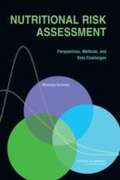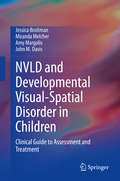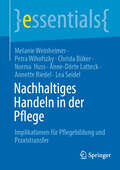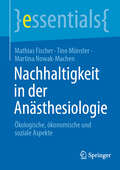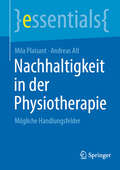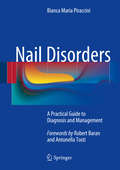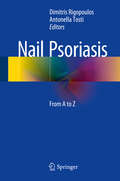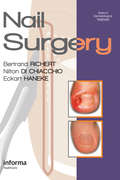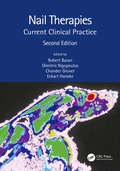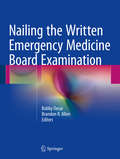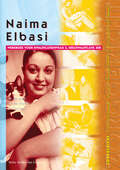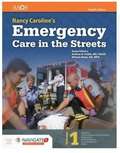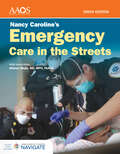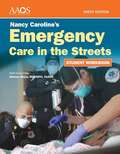- Table View
- List View
NSC Bloodborne and Airborne Pathogens Workbook
by National Safety Council StaffPART OF National Safety Council to save lives through education, research and advocacy.
NUTRITIONAL RISK ASSESSMENT: Perspectives, Methods, and Data Challenges
by Institute of Medicine of the National AcademiesThe National Academies Press (NAP)--publisher for the National Academies--publishes more than 200 books a year offering the most authoritative views, definitive information, and groundbreaking recommendations on a wide range of topics in science, engineering, and health. Our books are unique in that they are authored by the nation's leading experts in every scientific field.
NVLD and Developmental Visual-Spatial Disorder in Children: Clinical Guide to Assessment and Treatment
by John M. Davis Jessica Broitman Miranda Melcher Amy MargolisThis unique volume explores issues related to working with children who have nonverbal learning disability (NVLD). It examines how a child’s psychology – thoughts, feelings, beliefs – affects his or her functioning and learning. In addition, the book addresses how a child’s experiences are processed through individual personality, psychology, culture, environment and economic circumstances, and family dynamics. Using these psychological organizing principles, the book describes how to work most effectively with young patients with NVLD. It offers a new model and definition for understanding NVLD, emphasizing its core deficit of visual-spatial processing.In addition, this book addresses efforts to rename NVLD to developmental visual-spatial disorder (DVSD). It describes the 11 possible subtypes as including a primary deficit in visual-spatial processes and impairment in several additional functional domains, including executive functioning, social/emotional deficits, academic achievement, and motor coordination. The book highlights the need for psychologically minded treatment and provides specific intervention guidelines. It details how to conduct the intake process and create a treatment plan and team and offers practical suggestions for working with a patient’s family members. In addition, the book addresses the importance of working with a consistent psychological theory, such as control mastery theory (CMT). It describes the Brooklyn Learning Center Model for treating NVLD and offers guidelines for interventions to support patients academically. The book provides a comprehensive approach to the neuropsychological assessment of NVLD as well as examples of visual-spatial, sensory perception, executive functioning, academics, social/emotional deficits and motor coordination interventions, and all forms used to gather information from patients.Key areas of coverage include:Definition of nonverbal learning disability (NVLD).Efforts toward inclusion in the Diagnostic and Statistical Manual (DSM) and for renaming it to a developmental visual-spatial disorder (DVSD)Guide to general diagnostic testing and assessment.Developing a treatment plan and team for NVLD patients.NVLD therapy and tutoring priorities.NVLD and Developmental Visual-Spatial Disorder in Children is an essential reference for clinicians, therapists, and other professionals as well as researchers, professors, and graduate students in school and clinical child psychology, special education, speech-language therapy, developmental psychology, pediatrics, social work as well as all interrelated disciplines.
NY Doc Under the Northern Lights
by Amy RuttanEscaping the big city…For love under Icelandic skiesWhen surgeon Betty Jacinth’s heart is broken once again, she takes a job in Iceland for a change of scenery. She expects cold weather—but not the frosty welcome she receives from gorgeous but brooding Dr. Axel Sturlusson! Now father to his orphaned niece, Axel gradually thaws, and a flame ignites—but when Betty’s ex begs her to return, can she make the right choice for love?
Nachhaltige Gesundheitsversorgung in Entwicklungsländern und Global Health Governance: Eine Einführung (SDG - Forschung, Konzepte, Lösungsansätze zur Nachhaltigkeit)
by Wolfgang HeinDieses Lehrbuch analysiert die Gesundheitssituation und Gesundheitsversorgung in Industrie- und Entwicklungsländern, wobei diese Dichotomie kritisch hinterfragt wird. „Gesundheit“ wird im Kontext der Auseinandersetzung über nachhaltige Entwicklung diskutiert. Dabei stehen Ziel 3 der Nachhaltigkeitsziele der Vereinten Nationen und Gesundheitsaspekte anderer Nachhaltigkeitsziele im Fokus. Es wird ein Überblick gegeben über unterschiedliche Niveaus der Gesundheitsversorgung in verschiedenen Gruppen von Ländern des globalen Südens, vertieft durch eine detaillierte Analyse der Gesundheitssysteme in Costa Rica, Indien und der Demokratischen Republik Kongo. Der zweite Teil analysiert die Rolle der internationalen Gesundheitspolitik in diesem Zusammenhang (bilaterale und multilaterale Kooperation, Global Health Governance als komplexes Regime). Das Buch schließt mit zusammenfassenden Überlegungen zu den Perspektiven der Gesundheitsversorgung in Entwicklungsländern, wobei die Diskrepanzen zwischen dem breit akzeptierten Ziel der Garantie einer universellen Gesundheitsversorgung (Universal Health Coverage) bis 2030 und den real geringen Verbesserungen in den ärmsten Ländern herausgearbeitet werden.
Nachhaltiges Handeln in der Pflege: Implikationen für Pflegebildung und Praxistransfer (essentials)
by Annette Riedel Petra Wihofszky Melanie Weinheimer Christa Büker Norma Huss Änne-Dörte Latteck Lea SeidelDieses Essential richtet sich an Pflegefachpersonen, die als Changemaker vorangehen und zu Multiplikator:innen für nachhaltiges Handeln und Planetary Health werden möchten. Es bietet eine umfassende Übersicht der wichtigsten Entwicklungen im Bereich Nachhaltigkeit in der Pflege und liefert praxisnahe Beispiele sowie Ansätze zur erfolgreichen Implementation. Von ethischen Implikationen bis hin zu curricularen Hinweisen – die Autor:innen kombinieren theoretisches Wissen mit praktischen Beispielen aus der Pflegebildung und -praxis. Sie vermitteln nicht nur breites Grundlagenwissen, sondern geben auch konkrete Impulse für den Weg zur Multiplikator:in für nachhaltiges Handeln und Planetary Health. Lesen Sie, wie Pflegende zur treibenden Kraft für eine nachhaltige Zukunft werden können!
Nachhaltiges Personalmanagement in der Pflege - Das 5-Säulen Konzept
by Julia HornungIn dem Buch wird ein ganzheitliches und flexibel einsetzbares Personalmanagementkonzept vorgestellt. Ausgezeichnet mit dem HR-Nachwuchspreis 2011, kann das Konzept an jede Art von Einrichtung angepasst werden. Ausgangspunkt ist eine Analyse des Ist-Zustands einer Einrichtung für die Bereiche Gesundheitsmanagement, Lebenslanges Lernen, Organisation und Arbeitsgestaltung, Personal- und Rekrutierung sowie Führung. Jede der fünf "Säulen" wird mit Maßnahmen, Handlungsvorschlägen und Checklisten vorgestellt und anhand von Fallbeispielen erläutert.
Nachhaltiges Personalmanagement in der Zahnarztpraxis
by Julia-Katharina JonenVon der Einbehandlerpraxis bis zum MVZ - die Ressource Personal als wichtigster Erfolgsfaktor bestimmt die Handlungsfähigkeit einer Zahnarztpraxis. Dieses Buch soll Grundlagen zum Personalmanagement inkl. Handlungsempfehlungen und Praxisbeispielen liefern. Es liefert "die eigene Personalabteilung" in einem Hands-on-Werk, ohne Vorkenntnisse anwendbar und adressatengerecht umgesetzt. Mit diesem Werk ist jede Praxis in der Lage mit wenig Ressourcen eine eigene Personalabteilung aufzubauen und strukturiert und systematisch umzusetzen. Von der Personalverwaltung, über -gewinnung, -entwicklung und einem Exkurs ins Employer Branding findet sich jeder Fachbereich aus HR wieder. Um das Paket abzurunden werden Leitfäden zur praktischen Anwendung mitgeliefert. Speziell ausgerichtet auf die Besonderheiten einer Zahnarztpraxis.
Nachhaltigkeit in der Anästhesiologie: Ökologische, ökonomische und soziale Aspekte (essentials)
by Mathias Fischer Tino Münster Martina Nowak-MachenNachhaltigkeit besteht aus den Themenfeldern Ökologie, Ökonomie und soziales Handeln. Die Themen bedingen einander, bzw. sind Grundlage füreinander. Nachhaltigkeit gewinnt zunehmend an Bedeutung und zwar nicht nur die Umwelt betreffend, sondern auch die im Hinblick auf die Ressource Mensch und die gesellschaftliche Bedeutung von Gesundheit. Es ist wichtig sich diesen Themen zu stellen und für sein Arbeitsumfeld zu definieren.
Nachhaltigkeit in der Physiotherapie: Mögliche Handlungsfelder (essentials)
by Mila Plaisant Andreas AltDie Auswirkungen moderner Lebensstile konfrontiert Physiotherapeut*innen mit zwei essenziellen Verantwortungsfeldern. Dazu zählen zum einen die Überprüfung und die Reduktion des ökologischen Fußabdrucks und zum anderen der eigene Handlungsspielraum zur Förderung einer ökologisch vertretbaren und sozial gerechten Gesundheitsversorgung. Somit verdeutlicht gerade der letztgenannte Ansatz großes Potenzial für eine verantwortungsbewusste Physiotherapie.
Nachhaltigkeit und Lebensqualität: Durch schlanke, grüne und saubere Konzepte
by K. MuralidharanDieses Buch soll die Leser für das Thema Nachhaltigkeit sensibilisieren und sie ermutigen, die Bedeutung von „lean, green and clean“ (LGC) für den Alltag zu verstehen. Die Notwendigkeit von auf Messungen basierten Auswertungen, statistische Signifikanz bei Materialverbrauch und Energie werden erörtert. Das Buch konzentriert sich auf die Bedeutung von Fragen des Klimawandels und Umweltbelangen im Zusammenhang mit schlanker Produktion und Fertigung. Der Schwerpunkt liegt auf dem Verständnis und der Anwendung von Qualitätskonzepten durch Projektmanagement und messbasierte Bewertungsmethoden. Dieses Buch richtet sich an ein breites Publikum, darunter Studierende, Lehrkräfte, Qualitätsfachleute, Unternehmensberater, Lean- und Six-Sigma-Praktiker, und ist für sie von großem Nutzen.Die Übersetzung wurde mit Hilfe von künstlicher Intelligenz durchgeführt. Eine anschließende menschliche Überarbeitung erfolgte vor allem in Bezug auf den Inhalt.
Nachhaltigkeitskommunikation in der Gesundheitswirtschaft: Wie Sie nachhaltig agieren und glaubwürdig kommunizieren (Edition Nachhaltig wirtschaften)
by Viviane Scherenberg Tobias KestingDieses Buch beschäftigt sich mit der Innen- und Außenkommunikation „echter“ Nachhaltigkeit. Denn Kommunikation ist ein wichtiger Baustein, damit gelebte Nachhaltigkeit und nachhaltiges Handeln in der Praxis der Gesundheitswirtschaft funktionieren. Aus der Analyse verschiedener Ebenen (organisations-, produkt- und/oder prozessbezogen) und der Betrachtung unterschiedlicher Stakeholder-Perspektiven (insb. Patient*innen, Mitarbeitende, zukünftige Arbeitnehmer*innen und Gesellschaft) sowie unter Einbeziehung von Praxisbeispielen und Erkenntnissen aus Interviews zeigt das Autorenteam, wie nachhaltiges Handeln und dessen glaubwürdige Kommunikation in der Gesundheitswirtschaft umgesetzt werden können.
Nachhaltigkeitsmanagement im Gesundheitsbetrieb: Umsetzungsreife Konzepte für Klima- und Umweltschutz in Gesundheitseinrichtungen
by Andreas FrodlGesundheitsbetriebe sind gleichzeitig Betroffene und Mitverursachende des Klimawandels: Sie müssen Patient*innen, Bewohner*innen und Mitarbeitende vor dessen Auswirkungen schützen und gleichzeitig ihren Beitrag zum Umweltschutz leisten. Dieser Komplexität tragen die acht Leitfragen und daraus abgeleiteten Kapitel dieses Buches Rechnung.Als umfassende Anleitung zur Implementierung von Nachhaltigkeitsmanagement in Gesundheitseinrichtungen zeigt es, wie Klima- und Umweltschutz effektiv integriert werden können. Es behandelt die Herausforderungen und Chancen, Gesundheitsbetriebe nachhaltig auszurichten und bietet praxisnahe Lösungen zur Umsetzung. Zahlreiche Beispiele, Tabellen und Grafiken sowie konkrete Handlungsanleitungen und ein Glossar veranschaulichen und unterstützen diesen Ansatz.Für Führungskräfte, Nachhaltigkeitsbeauftragte und Entscheidungstragende im Gesundheitswesen, für Wissenschaftler*innen und alle, die die Zukunftsfähigkeit ihrer Einrichtungen nachhaltig sichern wollen.
Nachhaltigkeitsmanagement im Gesundheitswesen: Konzeptionelle Grundlagen und Orientierungshilfen (essentials)
by Matthias FischerDas Thema Nachhaltigkeitsmanagement gewinnt auch im Gesundheitssektor stark an Bedeutung. Nicht zuletzt, da auf Bundes- und europäischer Ebene neue rechtliche Anforderungen gestellt werden, die auch für viele Organisationen des Gesundheitswesens aktives Handeln in Richtung Nachhaltigkeit und Wahrnehmung der gesellschaftlichen Verantwortung erfordern.Dieses essential bietet Ihnen eine praxisnahe Einführung, durch die Sie sich eine Orientierung im Thema - eben mit spezifischem Fokus auf den Gesundheitsbereich - erarbeiten können. Es möchte bestehende Werke in diesem rasant wachsenden Feld nicht ersetzen, sondern um eine schnelle Orientierungshilfe ergänzen. Sie werden sowohl grundlegende Begrifflichkeiten und theoretische Hintergründe rund um das Thema Nachhaltigkeitsmanagement kennenlernen als auch Hilfestellungen zur Formulierung einer Nachhaltigkeitsstrategie oder zur Nachhaltigkeitsberichterstattung erhalten. Innerhalb kurzer Zeit können Sie sich so zunächst einen grundlegenden Überblick verschaffen und im Anschluss zum Aufbau eines Nachhaltigkeitsmanagements in Ihrer Organisation des Gesundheitswesens beitragen.
Nail Disorders
by Bianca Maria PiracciniThis book is designed to meet the need for a concise, easy-to-read text on how to approach and manage patients with nail diseases. The book opens with a description of nail anatomy and physiology, followed by a review of nail symptoms, divided according to the part of the nail apparatus involved. Non-invasive and invasive tools for the diagnosis of nail disorders are then described and insights provided into their appropriate use. Subsequent chapters review the various nail diseases, covering hereditary, traumatic, inflammatory, environmentally induced, drug-induced and neoplastic conditions as well as disorders due to systemic diseases. Informative high-quality illustrations are included for each disorder and boxes helpfully summarize the most important features, clues to diagnosis, necessary examinations, and treatments. Closing chapters address nail conditions in children and the elderly. Nail Disorders: A Practical Guide to Diagnosis and Management will be an invaluable, ready source of information for students in dermatology, clinical practitioners and podiatrists.
Nail Disorders: A Comprehensive Approach
by Archana Singal, Shekhar Neema and Piyush KumarNail disorders are a specialized group of disorders which are often neglected during post graduate teaching. This book aims to provide a comprehensive review covering the diagnostic and therapeutic aspects of nail disorders. It discusses the basics of nail unit, common conditions like infections, tumors and genetic diseases, diagnostic armamentarium involved in nail diseases like KOH mount, onychoscopy, imaging and surgical management of nail diseases which includes anesthesia of nail unit, nail biopsy and advanced nail procedures including video demonstration of such procedures. This book elaborates on nails in systemic diseases and briefly covers nail cosmetics and nail photography. Key Features Comprehensively reviews nail disorders Includes diagnosis, therapeutic and surgical aspect Discusses Onychoscopy Reviews the importance of nail photography
Nail Psoriasis
by Antonella Tosti Dimitris RigopoulosNail psoriasis is very common and causes considerable morbidity to patients. With the aid of informative illustrations, this book presents the clinical signs suggestive of nail psoriasis and describes the differential diagnosis of nail abnormalities. Newer methods of diagnosis are considered, and advice is provided on the use of severity evaluation indexes. The available treatments are extensively discussed, with information on the latest options. Selection of the appropriate treatment may be a challenge, so guidance is provided on all factors that should be taken into consideration and on choice of treatment for special categories of patient, such as children and pregnant women. Contributors have been selected from across the world, offering an international perspective on the condition. Nail Psoriasis will be an invaluable up-to-date source of information for dermatologists and will also be of interest to rheumatologists and general practitioners.
Nail Surgery (Series in Dermatological Treatment)
by Bertrand Richert Nilton Di Chiacchio Eckart HanekeA comprehensive practical guide to all types of nail surgery, including some cosmetic procedures, this is a master-class for those wishing to perform nail surgery, with clear descriptions of each stage involved and of any complications and how to deal with them.
Nail Therapies: Current Clinical Practice
by Robert BaranEdited by Robert Baran, MD Honorary Professor, University of Franche-Comté; Nail Disease Center, Cannes, FranceDimitris Rigopoulos, MD, PhD Professor of Dermatology-Venereology, School of Health Sciences,National and Kapodistrian University of Athens, Greece Chander Grover, MD, DNB, MNAMS Professor of Dermatology, University College of Medical Sciencesand GTB Hospital, Delhi, India; Department of Dermatology, Inselspital, University of Bern, Switzerland Eckart Haneke, MD Dermatology Practice Dermaticum, Freiburg, Germany; Centro de Dermatología Epidermis, Instituto CUF, Porto, Portugal; Kliniek voor Huidziekten, Universitair Ziekenhuis, Ghent, Belgium A succinct guide to treatment options, both medical and surgical, for both disorders and injuries of the nail. From reviews of the first edition:"This is a book about nail therapies that is relevant clinically while remaining a manageable size. It would be a useful tool for all clinicians managing nail disease, from the trainee to those embarking on a clinic dedicated to nail disease." Br J Dermatol Contents: Anatomy and physiology of the nail unit * Psoriasis * Onychomycosis * Novel and emerging pharmacotherapy and device-based treatments for onychomycosis * Lichen planus * Onychotillomania (onychophagia, habit tic, median canaliform onychodystrophy) * Eczema * Acrodermatitis continua of Hallopeau * Herpes simplex (herpetic whitlow, herpetic paronychia) * Acute paronychia * Chronic paronychia * Warts * Yellow nail syndrome * Onycholysis * Nail fragility and beautification * Nail prostheses * Nail pigmentation * How to prevent and treat chemotherapy-induced nail abnormalities * Intralesional nail therapies * Drug side effects on the distal phalanx * Classical nail surgery and removal of the proximal nail fold * Surgery of some common nail tumors * Nail surgery complications * The painful nail * Radiation and the nail
Nailing the Written Emergency Medicine Board Examination
by Brandon Allen Bobby DesaiThis book is a comprehensive and up-to-date study guide for those preparing to take the written emergency medicine board examination. It serves as a concise text of emergency medicine. It is distinguished by a problem-oriented approach and is presented in a visual and easily comprehensible format. The reader is walked through how to arrive at the diagnosis for each potential emergency situation, with each diagnosis or problem broken down into signs, symptoms, workup (labs and imaging), and disposition. This useful guide captures the latest developments in emergency medicine, including the newest technologies and methodologies, such as ultrasound, and simulation, which are becoming an increasingly important part of emergency medicine education and practice, as reflected in the board exam. This is an ideal tool for emergency medicine residents and faculty, critical care trainees, physician assistants and nurses working in emergency medicine, and medical students.
Naima Elbasi
by M. De Haan N. Van Halem Mevrouw S. OostveenZorgcategorie: Chronisch zieken Setting: ThuiszorgKorte inhoud: In dit werkboek staat het werk van verzorgende Naima Elbasi centraal. Een zelfbewuste jonge vrouw van Marokkaanse afkomst die met hart en ziel werkt in de zorg voor chronisch zieken in de thuiszorg. De thuiszorg is de grootste zorgsetting van de gezondheidszorg. Mensen ontvangen thuis diverse vormen van hulp: huishoudelijke zorg, begeleiding, verzorging en/of verpleging. Het accent in het werk van Naima ligt op de voorlichting en ver- zorging van chronisch zieke zorgvragers en van gezinnen met kinderen. De aard van de zorgrelatie kan zowel kort- als langdurend zijn.
Naming the Leper: Poems
by Christopher Lee ManesBetween 1919 and 1941, five relatives of Christopher Lee Manes were diagnosed with an illness then referred to as “leprosy” and now known as Hansen’s disease. After their diagnosis, the five Landry siblings were separated from their loved ones and sent to the National Leprosarium in Carville, Louisiana, where they remained in quarantine until their deaths. Drawing on historical documents and imaginative reconstructions, Naming the Leper tells through poetry this family’s haunting story of exile and human suffering. While confined at Carville, the Landry siblings attempted to keep some connection to the outside world by writing letters to family members and other loved ones. Manes incorporates materials from this correspondence, along with medical records, the leprosarium newsletter, and personal interviews, as he crafts poems that reconstruct his relatives’ daily lives at Carville. Although much can only be imagined, their words remain factual and their feelings of loneliness, abandonment, and pain become explicit. Poetry cannot bring Manes’s relatives back to life, nor can it heal wounds nearly a century old, but it can capture the sufferings and traumas caused by disease and exile. As a work of documentary poetry, Naming the Leper demonstrates that a term like “leper,” whether a stigma attached to patients suffering from illness or a word inscribed on the caskets of the deceased, cannot define the lives of individuals or encompass the full extent of their legacies.
Nancy Caroline's Emergency Care In The Streets: Volume 1
by Bob Elling American Academy of Orthopaedic Surgeons Staff Barbara Aehlert Andrew PollakNancy Caroline's Emergency Care in the Streets, Eighth Edition is the next step in the evolution of the premier paramedic education program. This legendary paramedic textbook was first developed by Dr. Nancy Caroline in the early 1970s and transformed paramedic education. Today, lead editors Bob Elling and Barb Aehlert, with the American Academy of Orthopaedic Surgeons, are proud to continue this legacy and set the new gold standard for the paramedics of tomorrow. <p><p> This fully updated edition covers every competency statement of the National EMS Education Standards for Paramedics with clarity and precision in a concise format that ensures student comprehension and encourages critical thinking. This iconic text emphasizes the ideal that becoming a paramedic is a continual pursuit of growth and excellence throughout an entire career. Concepts of team leadership and professionalism are woven throughout the chapters, challenging students to become more compassionate, conscientious health care professionals as well as superior clinicians.
Nancy Caroline's Emergency Care in the Streets Essentials Package
by American Academy of Orthopaedic Surgeons (AAOS)The Ninth Edition teaches students the technical skills required of today’s paramedic while emphasizing other important professional attributes, including critical thinking, empathy, teamwork, communication, problem solving, and personal well-being.
Nancy Caroline's Emergency Care in the Streets Student Workbook
by American Academy of Orthopaedic SurgeonsNancy Caroline's Emergency Care in the Streets, Ninth Edition is the newest evolution in the evolution of the premier paramedic education programme. This legendary paramedic textbook was first developed by Dr. Nancy Caroline and transformed paramedic education. Today, lead editors Bob Elling and Barb Aehlert, with the American Academy of Orthopaedic Surgeons, are proud to continue this legacy and set the new gold standard for the paramedics of tomorrow. Dr. Caroline trained her paramedics to be well-rounded, compassionate, quick-thinking problem solvers. This Student Workbook helps students become great paramedics! Critical thinking skills are further developed through: realistic and engaging scenarios; ECG interpretation exercises; in-depth questions challenging students to determine treatment plans and practice filling in patient care reports Comprehension of the course material is aided through: anatomy labelling exercises; medical vocabulary matching exercises; short answer essay questions..

